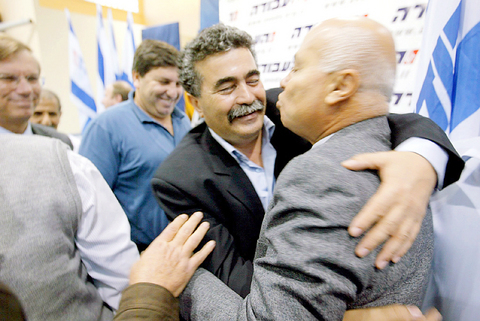In just one week as Labor Party leader, Amir Peretz has upended Israeli politics, crushing dissent in his fractious party and forcing Prime Minister Ariel Sharon to agree to early elections.
The rise of Peretz, a Moroccan-born Jew with only a high school education, also represented an ethnic upheaval for Labor, which has long been dominated by Jews of European descent.
Initially dismissed as a populist firebrand, Peretz stunned critics by rebranding Labor as the voice of the downtrodden and shifting Israel's political debate from the conflict with the Palestinians onto taxes, worker rights and the wide gap between the haves and the have-nots.

PHOTO: EPA
Peretz, the country's top union leader, re-energized a Labor Party that had grown increasingly weak and was in danger of disintegrating into irrelevance, Nahum Barnea, a columnist for the daily Yediot Ahronot, said on Friday.
"With Amir maybe they will be buried also, but it will be a much more interesting and lively burial," he said.
After seizing control of Labor on Nov. 9 in a surprise primary victory over 82-year-old veteran politician Shimon Peres, Peretz, 53, immediately began forcing his will on everyone from recalcitrant party leaders to the prime minister.
Early elections
Cabinet ministers whispered of a revolt when Peretz demanded the party pull out of the coalition government and force early elections.
Refusing to back down, he burst into their offices and forced them to sign undated letters of resignation, according to Israeli media reports.
Sharon also dismissed his calls for an early election, but by the time the two men met on Thursday, the prime minister's coalition was crumbling and he agreed to call a vote by the end of March, eight months ahead of schedule.
"[Peretz] is out to win and in a big way. So it was important for him to prove from the very first week that he's the boss,'' political analyst Yoel Marcus wrote in the Haaretz daily.
Labor leaders hope Peretz will appeal to disenfranchised Jews of Middle Eastern descent, who bitterly abandoned the party decades ago.
But Peretz could also repel immigrants from Russia -- never traditional Labor voters -- who view him as a Bolshevik, look down on his Moroccan roots and fear he will be too accommodating to the Palestinians, Barnea said.
Revival
Before Peretz, political analysts were preparing obituaries for Labor, the party that led Israel for its first three decades.
They contended that Labor lacked a clear message and did not present itself as a viable alternative to Sharon's hardline Likud.
Labor remained in Sharon's coalition though it opposed the government's free-market policies, and Sharon's decision to pull out of the Gaza Strip unilaterally stripped Labor of part of its peace platform.
Peretz quickly reframed the political debate, taking advantage of a lull in violence after five years of Israeli-Palestinian fighting to focus on social issues and accuse Sharon's government of increasing poverty and social inequality.
He has advocated repairing Israel's frayed social safety net, with the centerpiece of his campaign a call to raise the monthly minimum wage to US$1,000 -- a demand that has the support of more than 80 percent of the public, according to two polls published on Friday.

ANGER: Unrest worsened after a taxi driver was killed by a police vehicle on Thursday, as protesters set alight government buildings across the nation Protests worsened overnight across major cities of Indonesia, far beyond the capital, Jakarta, as demonstrators defied Indonesian President Prabowo Subianto’s call for calm. The most serious unrest was seen in the eastern city of Makassar, while protests also unfolded in Bandung, Surabaya, Solo and Yogyakarta. By yesterday morning, crowds had dispersed in Jakarta. Troops patrolled the streets with tactical vehicles and helped civilians clear trash, although smoke was still rising in various protest sites. Three people died and five were injured in Makassar when protesters set fire to the regional parliament building during a plenary session on Friday evening, according to

Australia has announced an agreement with the tiny Pacific nation Nauru enabling it to send hundreds of immigrants to the barren island. The deal affects more than 220 immigrants in Australia, including some convicted of serious crimes. Australian Minister of Home Affairs Tony Burke signed the memorandum of understanding on a visit to Nauru, the government said in a statement on Friday. “It contains undertakings for the proper treatment and long-term residence of people who have no legal right to stay in Australia, to be received in Nauru,” it said. “Australia will provide funding to underpin this arrangement and support Nauru’s long-term economic

‘NEO-NAZIS’: A minister described the rally as ‘spreading hate’ and ‘dividing our communities,’ adding that it had been organized and promoted by far-right groups Thousands of Australians joined anti-immigration rallies across the country yesterday that the center-left government condemned, saying they sought to spread hate and were linked to neo-Nazis. “March for Australia” rallies against immigration were held in Sydney, and other state capitals and regional centers, according to the group’s Web site. “Mass migration has torn at the bonds that held our communities together,” the Web site said. The group posted on X on Saturday that the rallies aimed to do “what the mainstream politicians never have the courage to do: demand an end to mass immigration.” The group also said it was concerned about culture,

Philippine President Ferdinand Marcos Jr has fired his national police chief, who gained attention for leading the separate arrests of former Philippine president Rodrigo Duterte on orders of the International Criminal Court and televangelist Apollo Carreon Quiboloy, who is on the FBI’s most-wanted list for alleged child sex trafficking. Philippine Executive Secretary Lucas Bersamin did not cite a reason for the removal of General Nicolas Torre as head of the 232,000-member national police force, a position he was appointed to by Marcos in May and which he would have held until 2027. He was replaced by another senior police general, Jose